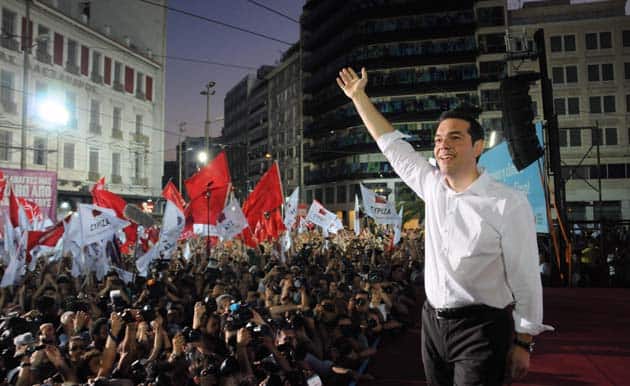Alex Callinicos looks at the challenges facing Greece’s new left government—and the ideas behind its strategy
It’s hard to overstate the historic significance of the election victory of the radical left party Syriza in Greece last month.
The left has drawn close to power in Greece before. As the Second World War ended, the Communist Party’s role in the resistance to the brutal German occupation put it at the head of a broad national coalition.
Britain and then the US intervened to reimpose the monarchy in a bloody civil war.
In the early 1960s student protests and workers’ strikes drove a mass movement against the monarchy.
Again, the Communist Party (KKE) was very influential. In April 1967 the military seized power to block a victory by the left.
Now a party originating in a series of splits from the KKE is in government. Will Greek and international capital allow it to survive when earlier left movements were crushed?
In the past 30 years Greece has seen the most intense social struggles in Europe under governments of both the centre left (Pasok) and centre right (New Democracy, ND).
These peaked in 2010-12 in response to the imposition of a brutal austerity regime at the behest of the “Troika”. This is the European Commission (EC), European Central Bank (ECB), and International Monetary Fund.
Turmoil
Some 32 general strikes alongside occupations of city squares and mass protests threw Greece into turmoil.
Syriza’s advance from a relatively marginal party to challenger for government in barely two years was a product of these mass movements.
The social base of Pasok, dominant in Greek politics since the early 1980s, evaporated. Syriza became the main party of the urban working class in the elections of May and June 2012.
But intense campaigns of fear allowed ND under Antonis Samaras to squeeze ahead and form another pro-austerity government.
The sheer material suffering that austerity has caused is something no developed capitalist society has experienced since the 1930s.
This tilted the electoral balance further leftwards. So did some determined struggles, including against the fascists of Golden Dawn and Samaras’ attempt to shut down the state broadcaster ERT.
The combined vote of the radical left was nearly 42.5 percent, including the KKE and the Anticapitalist Left Front (Antarsya) which have considerable influence in the workers’ and student movements.
Syriza offered a programme of measures aimed at reversing the worst effects of austerity. But the new government faces a strategic problem.
Greece is bound in a straitjacket of austerity by the “memoranda of understanding” signed by successive Greek governments and the EC in 2010-12.
Originally Syriza said it would scrap these memoranda while keeping Greece within the eurozone.
More recently its spokespeople—for example, the new finance minister Yanis Varoufakis—have dropped the promise to scrap the memoranda. They emphasise instead renegotiating the terms on which Greece repays its debt.
Many mainstream economists support this idea. It’s widely acknowledged that Greek public debt, 175 percent of national income, is too high to be repaid.
The problem is that this is flatly rejected by EC president Jean-Claude Juncker, German chancellor Angela Merkel, and other dominant figures in the EU. For the German ruling class, austerity is a way of maintaining its high-export, low-inflation economic model.
The ECB’s recent decision to introduce quantitative easing—effectively printing money to revive the eurozone economy—was a political defeat for Merkel.
She will be worried that a concession to Greece will lead to similar demands to relax austerity elsewhere in Europe.
Podemos, the rising new party in the Spanish state, hopes to follow Syriza’s example. More mainstream politicians in Portugal, Italy, and even France would be happy to see Germany’s grip on the eurozone weakened.
So the Tsipras government faces very powerful external pressures. How can it overcome them?
Marxist political theorist Stathis Kouvelakis, a leading figure on the left of Syriza, recently argued that in Greece “we see a confirmation of the attitude of Gramscian-Poulantzian option, of seizing power by elections, but combining that with social mobilisation.”
Seized
He went on, “The state has to be seized from the inside and from the outside, from above and from below.”
Nicos Poulantzas, another Greek Marxist political theorist, in the late 1970s advocated “a struggle within the state”. This would be “designed to sharpen the internal contradictions of the state, to carry out a deep-seated transformation of the state” supported by new “structures of direct democracy at the base”.
There are two problems with such a strategy. First, there are limits to “the internal contradictions of the state”. In particular, a viable capitalist state needs the repressive apparatuses—the army, police, security and intelligence services—to remain committed to preserving the existing order.
Revolutionary Marxists—including Antonio Gramsci as much as Lenin or Trotsky—have always argued something different. The only way to counter this coercive core of the state is through building up the alternative forms of power created by workers in the course of their struggles.
This leads to the second problem. The typical pattern of left governments is that they tend to block this process, both to preserve their own authority and to increase their bargaining room with the ruling class.
For example, the Popular Unity government of Salvador Allende in Chile discouraged the formation of “cordones”—coordinations created by working class activists—in the lead-up to the military coup of September 1973.
Since early 2012 the level of strikes and protests in Greece has fallen sharply as working people waited for a Tsipras government.
Syriza supporters blocked a national teachers’ strike in May 2013 that could have relaunched the anti-austerity movement. Kouvelakis admits, “we don’t have…strong and stabilised organisations of the subaltern classes from which we can fight in situations of protracted confrontation.”
The extraordinary basis on which the new government has been formed, as a coalition with the right-wing anti-austerity Independent Greeks (Anel), points towards further demobilisation.
The Guardian’s Paul Mason justified this decision as a way to “create a stable government for Syriza”, which is two seats short of a parliamentary majority.
But he undermines his own argument by pointing out that “Syriza can rely on the support or abstention of 15 communist MPs in any economic measures against austerity.”
Not only was the coalition unnecessary, it brought into government what Kouvelakis calls “a party of the right, one that is particularly concerned to protect the ‘hard core’ of the state apparatus”.
Its leader, Panos Kammenos, a homophobe and Antisemite with links to Greece’s big shipowners, now heads one section of this hard core as minister of defence.
His presence will make it much harder to build the unity of “native” Greek and migrant workers for which anti-racist campaigners have been striving.
Meanwhile the police is known to contain many Golden Dawn supporters. Despite the jailing of its leader, Golden Dawn is far from finished. It came third in the election with 6.28 percent of the vote, little less than it won in 2012.
So Syriza faces powerful antagonists both internally and externally. It will not overcome them thanks to its ministers’ charm or negotiating skills.
The strength of the left in Greece depends on the revival and further expansion of the mass movement that developed so explosively 2009-12.
Revolutionary socialists should celebrate the new government’s victory and support the progressive measures it takes. But the entire Greek radical left will be judged by how successfully they promote working people’s self-organisation, confidence, and combativity.
That is where the power to end austerity lies.






